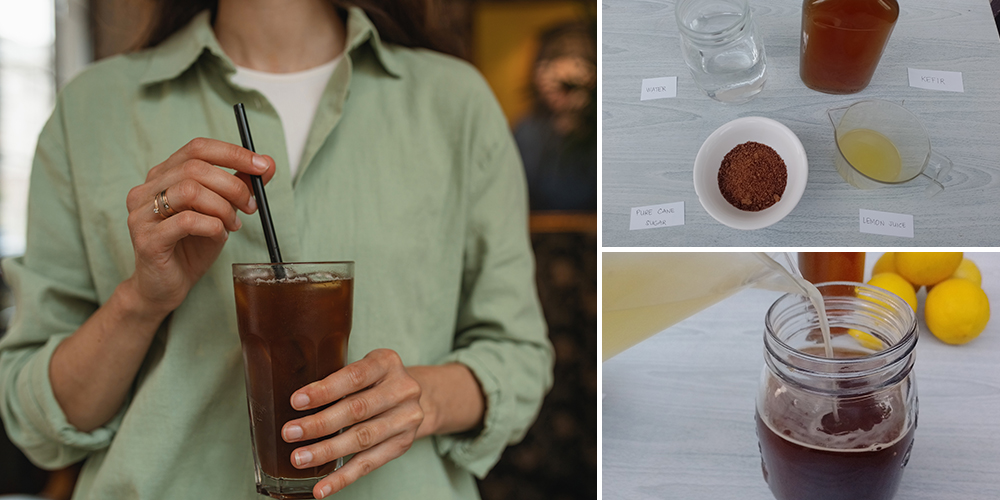
DIY Probiotic Lemonade
Lemonade is an all-season beverage you can take at any time, especially when you are feeling a little down. A warm cup of lemonade can clear a slight sniffle while a cold one is a reprieve on hot summer days. Fermenting lemonade produces a probiotic lemonade, making the drink even better.
A fermented probiotic lemonade is full of important microorganisms that boost the gut microflora. It helps improve digestion and also amps the immune resistance.
What Is in A Probiotic Lemonade?
A probiotic lemonade is just like your regular lemonade but fermented for a couple of days to grow the beneficial gut bacteria.
The fermentation process produces lactic acid bacteria (LAB) that contain compounds like organic acids, ethanol and antimicrobial compounds. These compounds are responsible for extending the shelf life of fermented food by inhibiting spoilage.
The bacteria have adapted to its environment during the fermentation process. They need to be kept alive; and when taken, may help rebuild the population of good bacteria in the gut.
Probiotics are also abundant in yogurt and dairy products. The most popular probiotic-rich products are sauerkraut, kefir, tempeh, kimchi, pickles and kombucha. Dark chocolate, miso soup and microalgae are also rich sources of probiotics.
Benefits of Probiotic Lemonade
Probiotics play important roles not just in digestive functioning but also in other body processes. They need to be consumed in sufficient amounts to ensure adequate bacteria reach the stomach.
Drinking probiotic lemonade may help in:
Preventing Infections
Probiotics inhibit the growth of pathogens by modulating the immune response. It can lower the chances of getting sick and shorten the severity and duration in case you do get sick. Probiotics produce antimicrobial activity and are being explored as a possible treatment for infectious diseases.
⇒ How Can I Prevent a Urinary Tract Infection? (Video)
Promoting Better Digestion
The most important role of prebiotics is in restoring the gut microflora. Good and bad bacteria thrive in the gut, and sometimes, the bad guys overthrow the good. Poor quality gut microbiome can cause problems like food intolerance and indigestion. Introducing millions of live microorganisms from prebiotics may help solve the problem.
Regulating Bowel Movements
Good digestion reduces the risk of constipation. Probiotics regulate intestinal health and improve bowel movement and its frequency. The short-chain fatty acids produced during fermentation can regulate a healthy colon for proper bowel movement.
Reducing Sensitivities and Allergies
According to several studies, probiotics may also play a role in the treatment and prevention of allergies. Probiotics interact with the gut microbiota, lymphocytes and metabolites in the intestinal mucosal immune system. It may intervene with food allergies by maintaining immune tolerance.
Alleviating Gastrointestinal Infections
Gastro infections are common and we usually get them from contaminated food or close contact with people having the virus. The mix of active bacteria in probiotics may effectively combat these pathogens and reduce the number of sick days for gastroenteritis. Probiotics may also be effective against food poisoning, yeast infections and traveler’s diarrhea.
Boosting the Immune System
Lemonade is packed with Vitamin C, which is highly valued for its effect on the immune system. Fermenting lemonade boosts this effect with the help of gut-friendly bacteria. It also introduces other essential minerals and beneficial acids like lactic acid and short-chain fatty acids.
Balancing the pH
Short-chain fatty acids (SCFA) are the food for the cells in the colon decreasing the pH level and preventing acidification. Taking probiotics increases the SCFA compounds and lactic acid, which helps balance the intestinal pH level. They are necessary in preventing the growth of pathogens and neurological problems.
Boosting the Mood and Cognitive Function
The gut and the brain are connected in a partnership called the gut-brain axis, which means that the activities in the digestive tract can affect the central nervous system. A healthy digestive system modulates the CNS through hormonal and enzymatic connections. It helps reduce depression, anxiety and cognitive impairment.
While it is not a cure-all for cognitive problems, probiotics do help improve their functions and alter moods to become healthier and more positive.
Managing Non-Alcoholic Fatty Liver
Lactobacillus and Bifidobacterium are two important probiotics used in probiotic therapy to manage fatty livers. They are often prescribed as food supplements but are also available in every glass of fermented lemonade. Probiotics help strengthen the mucosal barrier and improve the gut-liver axis to help modulate liver diseases.
Managing Weight
If you are trying to lose weight, lemonade is one beneficial drink to think of because of the anti-obesity properties of lemons. And if you want to shed off that belly fat, a probiotic lemonade is an even better idea. The regulation of your gut bacteria positively affects your body weight by curbing your appetite and increasing your energy level. It may help deplete the fat storage for a healthier way of losing weight.
DIY Probiotic Lemonade
Give a twist to the classic summertime drink by fermenting it into a probiotic beverage. You will need some lemons, sugar and a starter culture to kickstart the fermentation.
For the starter culture, you may use whey, water kefir, ginger bug or brine from other ferments. You can extract whey by straining it (the liquid) out of a yogurt.
For this particular recipe, I used water kefir for a dairy-free and vegan fermented lemonade. It also has cane sugar, which serves as food for the probiotics in kefir. Yes, you can use honey or maple but they are not as effective as raw sugar in jumpstarting the fermentation.
If you are using live water kefir, prepare the culture by dissolving 1 tbsp kefir and 1 tbsp pure cane sugar in 2 cups of water. Cover and let sit for at least 24 hours until it is sour enough for harvest. Strain the grain and transfer the kefir water to a new bottle for storing.
Ingredients 
- 2 cups filtered water
- ¼ cup pure cane sugar (or honey)
- 1/3 cup freshly squeezed lemon juice (about 2 to 3 lemons)
- 2 tbsp water kefir or whey
Steps
- Dissolve the sugar completely in water.

- Add the lemon juice and kefir or whey and continue stirring until mixed well.

- Cover and let it sit in a warm spot for about 2 to 7 days.

The longer you let the lemonade steep, the sourer the lemonade will become. However, in cold seasons, you may need to ferment it longer to infuse more flavor and introduce a wide variety of bacteria. Check for the level of sourness every day to determine how sour you want your lemonade to be. If you are okay with its flavor, then go ahead and harvest it for use.
To use: Drink a cup of the probiotic lemonade, preferably on an empty stomach, to get the most benefits. There is no established dosage for probiotics in a day but it is still important to take it in a moderate amount. You can always test it out by starting with small amounts and noticing how your body reacts.
If you want to ensure maximum intake of probiotics, choose variety. You can get probiotics by eating yogurt, some cheeses, green olives, kimchi, and other fermented vegetables.

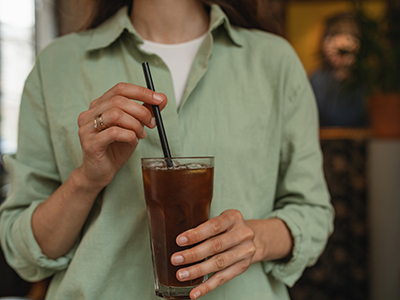
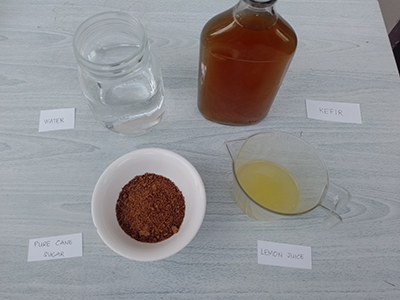
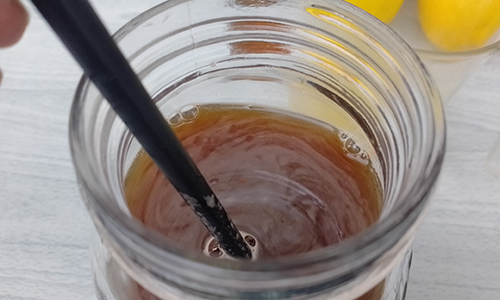
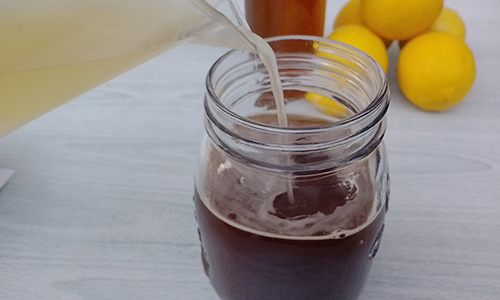
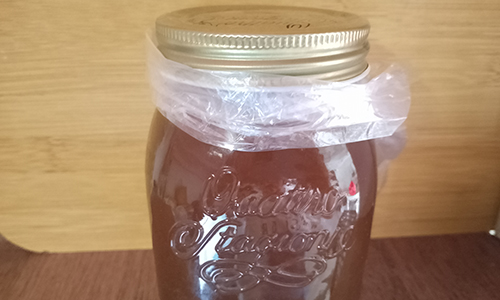
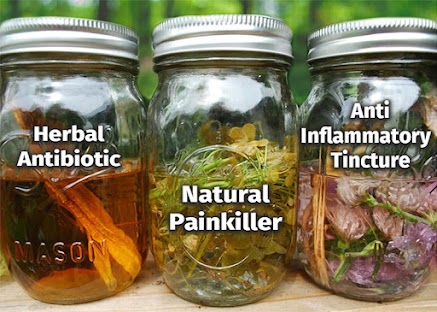
I would like to know what to take for the pains that you are talking about but I have not got the time to go through the spiel that you put on.
You had the time to post!
We always have [store bought) Kefir but what is Kefir-Water?
Great question, Brooke!
Store-bought kefir is typically a fermented milk drink made from cow, goat, or sheep milk. It’s packed with probiotics and has a tangy, slightly effervescent taste.
Kefir water, on the other hand, is a dairy-free alternative made by fermenting water with kefir grains, which are clusters of bacteria and yeast. These grains feed on sugar and produce beneficial probiotics in the process. It’s similar to kombucha but with different microorganisms. You can make it at home using a starter culture, sugar, and water. It’s perfect for those who are lactose intolerant or following a vegan diet.
So, while store-bought kefir is more like a drinkable yogurt, kefir water is a refreshing, fizzy beverage you can enjoy without any dairy.
Hope this helps!
Many Blessings and Good health!
what is water kefir and where do you get it?
Hey Colleen!
Water kefir is a probiotic beverage made by fermenting water with kefir grains. These grains aren’t actually grains like wheat or rice but rather clusters of beneficial bacteria and yeast.
Many health food stores sell water kefir, online retailers and even local markets. Or, you can make it yourself if you get the grains only. If you want to try making it, you’ll need kefir grains, sugar, and water. Just dissolve the sugar in water, add the grains, and let it ferment for 24-48 hours. You can find detailed recipes and starter kits online.
Many Blessings and Good Health!
what is kefir water? and whey? can one use the whey from a tub of yogurt?
it would be good if there was some clarification on this otherwise the recipe is useless. thanks
Yes, you can use the whey from a probiotic yogurt.
There is plenty of clairification. It clearly states that the whey from yogurt CAN be used. If you google search kefir water you will be able to find out what it is.
After harvest, how should it be stored? Can I put it in smaller bottles and place in the fridge? Just looking for shelflife in case I don’t drink it fast enough
Hey Pina,
Once bottled, store your probiotic lemonade in the refrigerator. Chilling the lemonade will slow down the fermentation process, which helps preserve the flavor and maintain the probiotic content.
When stored in the fridge, probiotic lemonade can last for about 2 to 4 weeks.
And yes, you can definitely transfer your probiotic lemonade into smaller bottles.
Many Blessings and Good Health!
Thank you for the recipe.
Can I continue to add water to this mixture as I drink it or do I have to make fresh batches each time it is used?
Hey Annette!
You could top off your drink, sure. You can add water and a bit of sugar to the remaining probiotic lemonade to keep the fermentation going. Keep in mind that continuously adding water and sugar will dilute the flavor and the concentration of probiotics over time. You might notice the lemonade becoming less tangy and less fizzy with each top-off.
To maintain a more consistent flavor and probiotic content, it’s generally best to start a new batch after a few top-offs. This ensures that the balance of bacteria, sugar, and acidity stays optimal.
Making fresh batches from scratch each time you finish a batch is ideal for the best taste and probiotic benefits. It’s a straightforward process once you get the hang of it, and this way, you can ensure the right balance and potency.
So, you can definitely top off the mixture as you go, but for the best results, refreshing with a new batch every now and then is recommended.
Many Blessings and Good Health!
I still have a tree full of mild grapefruit could I substitute this fruit for the lemon and make a fermented grapefruit probiotic? Would it have the same properties as the lemon?
I thank you for the content in this email…..I hope I can give it a go?? “Lemonade”